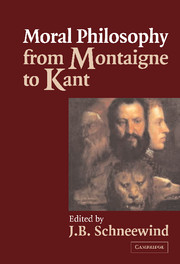Book contents
- Frontmatter
- Contents
- Preface
- Acknowledgments
- Foreword to the One-Volume Reprint
- Introduction
- PROLEGOMENA: SOME QUESTIONS RAISED
- PART I REWORKING NATURAL LAW
- Francisco Suarez
- Hugo Grotius
- Thomas Hobbes
- Richard Cumberland
- Samuel Pufendorf
- John Locke
- PART II INTELLECT AND MORALITY
- PART III EPICUREANS AND EGOISTS
- PART IV AUTONOMY AND RESPONSIBILITY
- Supplemental Bibliography
Samuel Pufendorf
Published online by Cambridge University Press: 05 June 2012
- Frontmatter
- Contents
- Preface
- Acknowledgments
- Foreword to the One-Volume Reprint
- Introduction
- PROLEGOMENA: SOME QUESTIONS RAISED
- PART I REWORKING NATURAL LAW
- Francisco Suarez
- Hugo Grotius
- Thomas Hobbes
- Richard Cumberland
- Samuel Pufendorf
- John Locke
- PART II INTELLECT AND MORALITY
- PART III EPICUREANS AND EGOISTS
- PART IV AUTONOMY AND RESPONSIBILITY
- Supplemental Bibliography
Summary
Introduction
Samuel Pufendorf, son of a Lutheran pastor, was born in 1632 in Saxony. After receiving a conventional education at Leipzig, he went to Jena for further work. There he studied mathematics and first read Grotius and Hobbes. In 1658, while serving as a tutor for a Swedish family during a war between Sweden and Denmark, he was arrested and imprisoned. In prison he wrote his first work, Elementorum jurisprudentiae universalis (Elements of Universal Jurisprudence), published in 1660. He returned to Germany to accept the first professorship in natural and international law at Heidelberg. Pufendorf s interest in contemporary affairs led him to publish in 1667 an analysis of the constitution of the Holy Roman Empire, which, he argued, was not helpfully explained by any known model. He then moved to a professorship in Sweden, where he wrote his great De jure naturae et gentium (On the Law of Nature and of Nations), which was published in 1672. In the next year he published a compact summary of this work, De offtcio hominis et civis (On the Duty of Man and Citizen).
These two works had an amazing reception. Despite its enormous length, the Law of Nature went through many Latin editions and was translated into every major European language, and the Duty of Man, in Latin or in modern languages, became the textbook with which students in much of Europe and in many of the American colonies studied natural law until well into the eighteenth century.
- Type
- Chapter
- Information
- Moral Philosophy from Montaigne to Kant , pp. 156 - 182Publisher: Cambridge University PressPrint publication year: 2002

